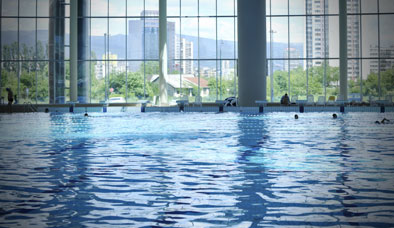
Diving is one of the most exciting pool activities you can undertake. Mastering and demonstrating the ability to dive cleanly into the water, leaving only tiny ripples behind, will keep you and your friends entertained for hours. But, diving accidents can cause death or very serious injuries so it is important to learn and practice diving safety precautions. When followed, these simple safety rules will greatly reduce the risk of diving accidents and injuries.
1. Know how deep the water is before you dive: It is important to only dive into water that is at least six feet deep. Diving into shallow water can result in serious injury, or even accidental drowning, if you hit your head on the bottom of the pool. When planning a dive into a swimming pool, you can use the location of the diving board as an indication of deep water.
2. Generally, the diving board is placed in the region of the swimming pool where the water is deepest. Also, numbers indicating the depth of the water are often painted on the ground, near the edges of the swimming pool. It is generally not recommended that you dive into unknown waters where you are unable to verify the depth of the water.
3. Plan your dive and check for the water for obstacles: Pay attention to the pool environment and scan the water for submerged pool toys and other potentially hazardous objects. Don't dive into water that you have not checked for obstacles. If children or adults are using flotation devices or pool loungers in the water, make sure that they know where you are planning to dive. Ask everyone in the pool to stay clear of your dive path.
4. Only dive from the end of a diving board: If the pool where you swimming has a diving board, use it. Most diving boards are equipped with a heavy duty, slip-resistant tread, made from sand or gravel, to prevent you from falling into the pool and sustaining an injury. Once you get up on the diving board, be sure to dive from the end.
5. Hold up your head and arms and make a shallow dive: Specialty jumps and dives, such as flips, belly flops and cannon balls, may be fun but are generally not considered safe. Attempting a complicated or silly dive can put you at risk of losing your balance or steering the dive incorrectly. A flip can be miscalculated and cause you to hit your head or limbs on the bottom of the diving board, while belly flops and cannon balls can easily veer away from the middle of the pool and put you at risk of crashing into a wall.
Know what to avoid: Diving into shallow water, running on or near the diving board, consuming alcohol or drugs before making a dive and diving from the side of the pool are the top causes of diving injuries. It is important to refrain from diving into water that is not at least 6 feet deep, and it is especially important to avoid making dives into bodies of water where the depth is not known or verified.
• Diving from the sides of the diving board is not safe because your chances of hitting the sides of the swimming pool increase greatly. Diving from the end of the diving board assures you a safe entry into the deep middle region of the pool. If the pool where you are swimming does not have a diving board, it is not recommended that you dive.
• If you are going to dive into a swimming pool, it is recommended that you aim for the deepest region of the pool and hold your arms over your head in standard diving position. Keep your head up and steer with your hands once you have left the diving board and are airborne. It is important to steer your dive towards middle of the pool, away from the pool edges where an injury could be sustained.
• Running on or near the diving board is unsafe because, even though modern diving boards are equipped with high quality tread to reduce slipping, a wet surface is difficult to navigate. Running can increase your chances of slipping off the diving board, or crashing into it, and sustaining a life threatening injury. In general, running should be avoided in all pool areas.
• Consuming alcohol or drugs is especially dangerous in relation to diving because these substances impair your ability to assess the amount of space and distance you need to dive safely. Alcohol and drugs can also lower your inhibitions and cause you to feel overconfident about your diving abilities, encouraging you to throw caution to the wind and attempt unsafe maneuvers.
• And, diving from the side of a pool is strongly discouraged because of the importance of avoiding contact with the cement, fiberglass, gunite or metal walls of the pool. The likelihood of miscalculating your dive and crashing into the side of the pool increases greatly when you dive near the water's edge. A diving board is designed to reduce this risk by positioning you away from the walls, near the middle of the pool's deep end.
Source: Florida pools
Written by Florida pools on 2012/08/23
